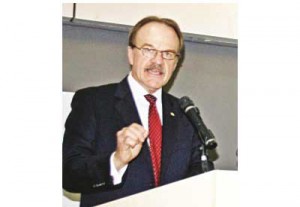


April 17, 2012
Duty-free garment exports to US hinge on new trade deal
US Ambassador Dan W Mozena yesterday linked Bangladesh's demand for duty-free access for garment exports to the Trade and Investment Cooperation Framework Agreement (TICFA) that both countries may sign in future.
Bangladesh has been demanding a duty-free access for garment products to the US market for long, as the country pays more than 15 percent tariff to get in.
“Soon we hope to conclude a bilateral TICFA, which will establish a forum that will identify and address obstacles for increased trade and investment between the two countries,” Mozena said at a discussion on US-Bangladesh Trade Relations at the FBCCI office in Dhaka.
The TICFA came as the second effort from the US after the first effort, the Trade and Investment Framework Agreement (TIFA), did not get through.
The US government later redesigned the TIFA as TICFA that promises to protect investment and form a platform to hold dialogues to remove obstacles in bilateral trade.
“The demand for duty-free access of Bangladeshi products to the US market is a very valid one, but if we can form the forum we will be able to identify the problems and opportunities for accelerating the bilateral trade,” he said.
Bangladesh is the second largest ready-made garment (RMG) exporter to the US after China. “Everyone should rejoice this,” he said.
In fiscal 2010-11, Bangladesh exported $5.10 billion to the US, of which 90 percent take up garment items. In the same period, Bangladesh imported goods worth $676 million from the US.
A total of 97 percent Bangladeshi goods enter the US market without any duty, but the garments, the country's main export items, have been left out.
As a result, the country's RMG products have to enter the US market paying a 15.3 percent duty and facing a stiff competition from China, India and Pakistan.
The resolution of getting duty-free access to the US market is not a decision of the Obama administration and the US embassy, it is the decision of the US Congress, he said.
“This is not the proper time to push the duty-free proposal to the US Congress, because it is the election time in the US,” he added. Citing Bangladesh as an attractive investment destination, Mozena said Americans will invest $1 billion in development assistance to Bangladesh over the next five years.
“Bangladesh is one of a few countries that is the focus of all three US presidential development initiatives to promote food security, improve health and address climate change,” he said.
Presiding over the function, FBCCI President AK Azad demanded the US government sign a free trade agreement between the two countries allowing wider access of Bangladeshi goods to the US market.
“Let's sign an FTA between the two countries. If we can remove the duty barrier, definitely we can increase trade and we will be able to come out of poverty,” Azad said. He said the US is supporting the rich countries like China, Canada, Mexico and Japan through eroding duty.
He said in 2011, the total amount of export of China to the US was calculated at $377.33 billion with duty at only three percent, Canada exported $274.77 billion with 0.9 percent duty, Mexico exported $228.33 billion with a little more than one percent duty while Japan exported $129 billion with 1.6 percent duty.
“But, Bangladesh, despite being a member of the least developed countries (LDCs) paid more than 15 percent duty,” he said. “Only aid is not the solution. We want duty-free market access to the US,” he said.
Former FBCCI president Abdul Awal Mintoo said no country on the earth can develop without having a good access to the US market.

Copyright © 2020, The Bangladesh Garment Manufacturers and Exporters Association.
Version-2.0, Design & Developed by Systech Digital Limited.
Version-2.0, Design & Developed by Systech Digital Limited.
